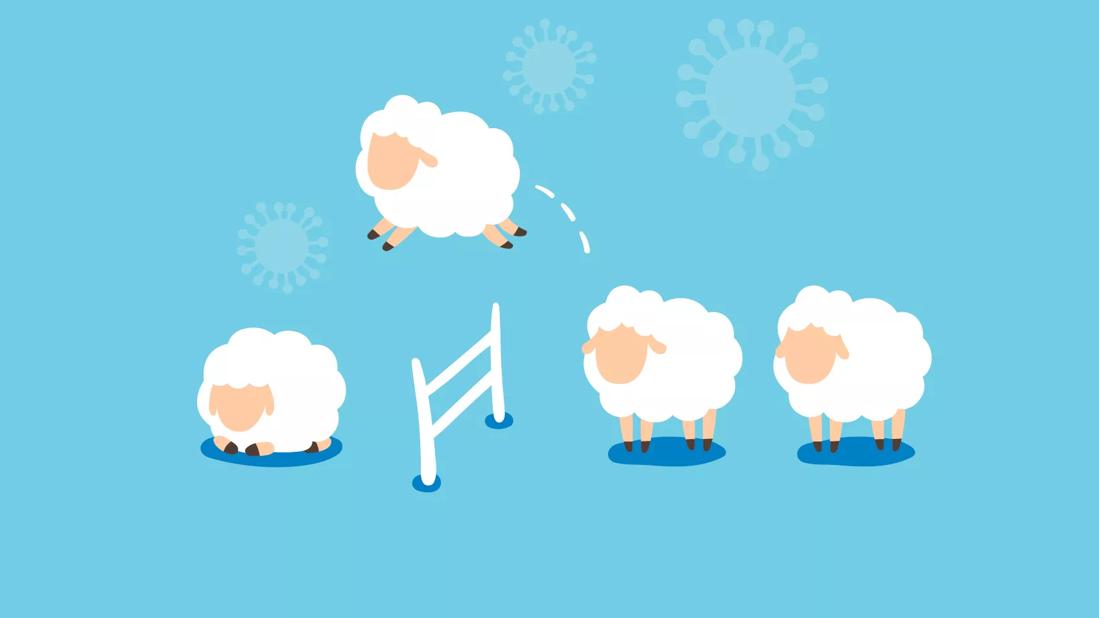COVID-19 can lead to a number of sleep disorders, including insomnia

Image content: This image is available to view online.
View image online (https://assets.clevelandclinic.org/transform/e8e1974e-78b7-40dd-9450-672602617cdf/InsomniaCOVID-607502734-770x533-1_jpg)
An illustration of sheep jumping over a fence.
There’s still much to learn about COVID-19 and its long-term effects on people who contract it.
Advertisement
Cleveland Clinic is a non-profit academic medical center. Advertising on our site helps support our mission. We do not endorse non-Cleveland Clinic products or services. Policy
For about 80% of people who have a mild reaction to COVID-19, their symptoms go away in about two weeks. Others who have more serious cases need between three and six weeks to recover. One important area of study right now focuses on a third group known as COVID-19 long-haulers, people who experience new symptoms or prolonged symptoms more than three to four weeks after infection. COVID-19 long-haulers may need several months to recover, and even then, some symptoms and additional conditions like sleep disorders tend to pop up and linger along the way.
“Sleep disorders are one of the most common symptoms for patients who’ve had COVID-19,” says sleep medicine specialist Cinthya Pena Orbea, MD. “They report insomnia, fatigue, brain fog and sometimes we even see circadian rhythm disorders.”
Dr. Pena Orbea shares what we know so far about COVID-19’s connection with sleep disorders and what we can do to help alleviate some of those symptoms.
Coined “coronasomnia,” COVID-19-induced insomnia is often attributed to pandemic-related stress, anxiety, depression and other mental health conditions.
“Long-hauler symptoms is a new phase of the pandemic,” says Dr. Pena Orbea. “This is an area that we’re still studying.”
Advertisement
While we’ve identified more than 50 long-term effects of COVID-19, some studies suggest neuropsychiatric symptoms like post-traumatic stress disorder (PTSD), anxiety and insomnia can worsen over time. And according to Dr. Pena Orbea, people who’ve had mental health conditions before contracting COVID-19 are at higher risk for developing worse anxiety and depression. This often results in someone developing a sleep disorder.
“The direct cause for long-hauler symptoms remains unknown,” says Dr. Pena Orbea. “Clinicians and researchers are exploring several possibilities that include having a persistent inflammatory state or an inadequate antibody response, and there’s another thought that there is ongoing viral activity that’s causing organ damage.”
And while general fatigue is a symptom of COVID-19, sleep disorders like insomnia can set in up to a couple of weeks after first contracting the virus. So on the surface, the sleep disorder might not seem connected, but chances are, it’s a result of contracting the virus itself.
There’s currently little data to determine exactly how long COVID-19-induced sleep disorders may last. According to Dr. Pena Orbea, it could last up to 12 months after beginning treatment.
Most commonly, Dr. Pena Orbea has seen circadian rhythm disorders arise as a result of COVID-19. In these cases, people have a delayed sleep cycle where they fall asleep much later into the evening or earlier in the morning. This delayed cycle extends into the following day, causing people to feel groggy, have chronic fatigue or wake up later than they prefer.
“Sleep is extremely important for the overall function of our bodies, including our metabolic systems and our immune systems,” explains Dr. Pena Orbea. “Since sleep is important for concentration and memory function, it will enhance how patients recover from the disease and impact their quality of life.”
To treat sleep disorders, including those caused by COVID-19, doctors often turn to cognitive behavioral therapy, light therapy, melatonin or a mixture of methods to help correct your sleep schedule and improve your sleep hygiene.
This can be a difficult question for some people because it’s easy to assume your loss of sleep is a result of a long day of work, moderate stress or a small, one-time problem. But Dr. Pena Orbea suggests any symptoms related to sleeplessness is a cause to get a checkup.
“It’s important to see your doctor whenever you’re developing a new symptom because it could be a sign or symptom of another disease and this is difficult to discern,” says Dr. Pena Orbea. “If you’re experiencing any symptoms that are interfering with your daily life, that’s when you need to call your doctor.”
Advertisement

Sign up for our Health Essentials emails for expert guidance on nutrition, fitness, sleep, skin care and more.
Learn more about our editorial process.
Advertisement
Chilblain-like skin lesions and rashes are mild (and rare) complications of many viral infections, not just COVID-19
Most can return to work or school when they’re symptom-free for 24 hours
Covering your mouth when you cough and staying home when you’re sick are a couple ways to help keep yourself and others COVID-free
This vital nutrient supports your health, but its role in COVID-19 prevention and treatment isn’t proven
Studies have shown promising results, but additional research is needed
Infection and inflammation can cause you to lose your voice and have other voice changes until you’re fully healed
A COVID-19 infection can bring on depression or anxiety months after physical symptoms go away
Just like the flu, COVID-19 continues to evolve every year with new and smarter variants
Prioritize your health by managing stress, strengthening your social connections and getting quality sleep
Bolsters, blankets, pillows and blocks can offer extra support, stability and comfort
Allergies, postnasal drip, asthma or reflux could be to blame for a cough that won’t quit